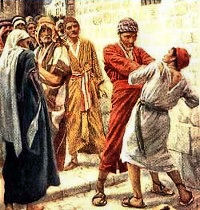It’s been ten years since two jetliners crashed into the Twin Towers in Manhattan, but Paul Fox can still see the flames and, in them, the faces of deceased friends and colleagues. At work on the fiftieth floor of the South Tower when the World Trade Center was hit, Fox emerged unharmed, yet hardly untouched. Seeing so many people killed and knowing he was Osama bin Laden’s target, too, changes you, he said in a recent interview with a Seattle, Washington, television station.
Even so, Fox recoiled at news videos of people wildly celebrating bin Laden’s death in May. “As a Christian, that kind of rejoicing at any person’s death doesn’t feel right.” Still, he struggles with forgiveness. “I’m having to search my soul about that. I’m not there yet,” he admits. (For a link to the interview, click here.)
Even when the offense is infinitely tiny compared to a terrorist attack, how hard it is to love our enemies and pray for those who persecute us. Considering how the world has grown more divided and less forgiving over the past ten years, this call has become especially challenging.
Is it really possible to forgive one another “from the heart,” as Jesus urges us to do (Matthew 18:35)? Not on our own strength alone! But we know Christ, and through his Holy Spirit, we have all we need to become ambassadors for forgiveness and unity. Though we may not consider ourselves very important or influential, our witness counts! Just think: If everyone reading this meditation today chose to become an agent of mercy, we just might change the world.
“ ‘It is not in our power not to feel or to forget an offense; but the heart that offers itself to the Holy Spirit turns injury into compassion and purifies the memory in transforming the hurt into intercession’ (Catechism, 2843). Holy Spirit, give me such a heart!”
Questions for Reflection or Group Discussion
(Sirach 27:30–28:7; Psalm 103:1-4,9-12; Romans 14:7-9; Matthew 18:21-35)
1. The theme of the Scripture readings could not be clearer: mercy and forgiveness. In the first reading we are warned against nourishing anger against others. How much of your day would you estimate is spent remembering and reliving conversations and/or circumstances when you were hurt or angered by another person? What steps can you take to let go of them?
2. In the same vein, why do you believe the first reading encourages us to remember our “last days” when it comes to holding on to unforgiveness, anger, and vengeance? How can you use this injunction during the day to check the amount of unforgiveness in your life?
3. The responsorial psalm speaks of the Lord’s healing and pardoning. Since the Lord has so generously pardoned you, who are the people in your life to whom you can provide healing and pardoning?
4. The second reading reminds us that we do not live or die for ourselves, but for the Lord. How can you make this a greater reality in your life? How do you think this Scripture relates to the need to change our behavior with regard to unforgiveness, anger?
5. Jesus’ parable of the king and wicked servant in the Gospel reading could not be more obvious: we will be forgiven to the same extent we forgive others. We cannot demand justice for everyone else and mercy for ourselves. (“Justice for them Lord, but mercy for me.”) How can knowing this reality impact the way you relate to others?
6. In light of the 10th anniversary of the 9/11 attacks, the meditation challenges us with these words: “Even when the offense is infinitely tiny compared to a terrorist attack, how hard it is to love our enemies and pray for those who persecute us.” The meditation also challenges us with the following question: “Is it really possible to forgive one another ‘from the heart,’ as Jesus urges us to do (Matthew 18:35)?” How would you answer this question?”
7. The meditation answers the above question this way. “Not on our own strength alone! But we know Christ, and through his Holy Spirit, we have all we need to become ambassadors for forgiveness and unity.” Are you willing to give up the obstacles in your life (e.g., unforgiveness, bitterness, resentment) that keep you from being “an ambassadors for forgiveness and unity”? If so, what do you think are your first steps to doing this?
8. Take some time now to pray that the Lord would give you the grace to forgive “from the heart” those who have hurt you or offended you. As the prayer at the end of the meditation suggests, pray and ask the Holy Spirit to give you such a heart.

 11th
11th 

